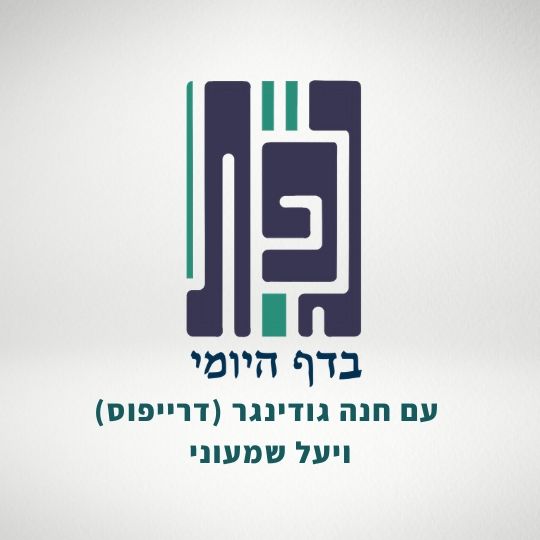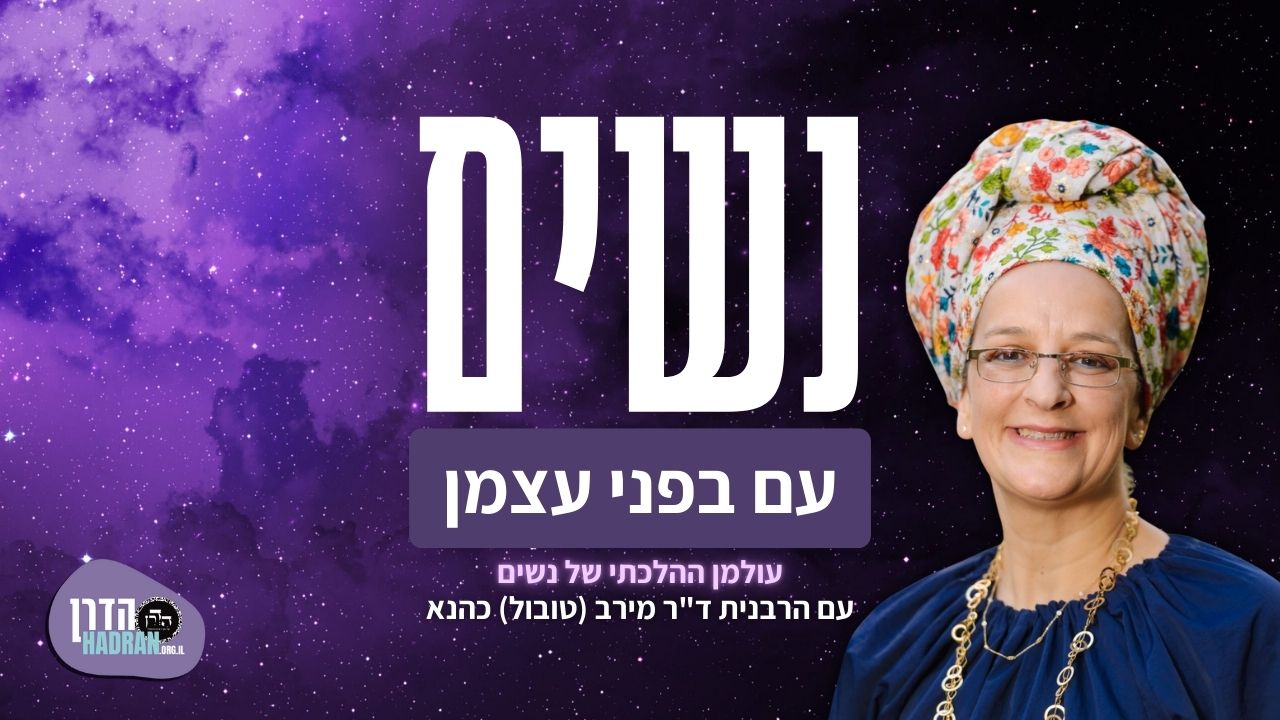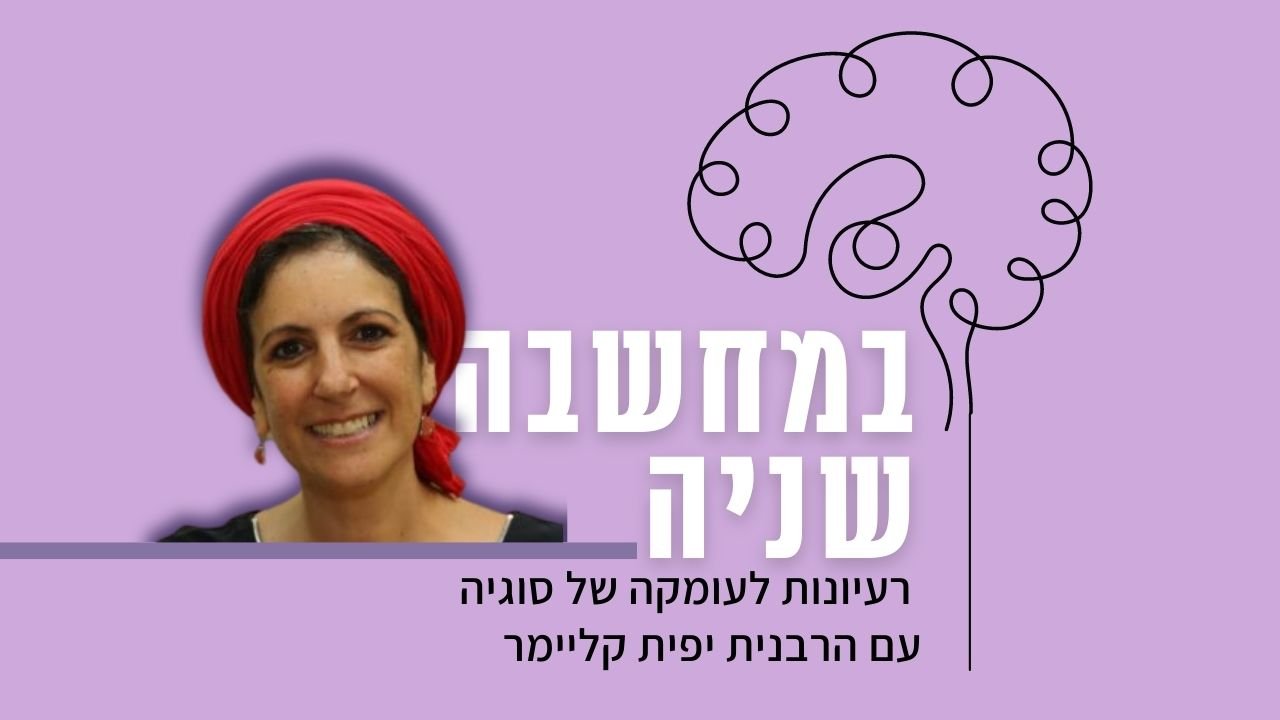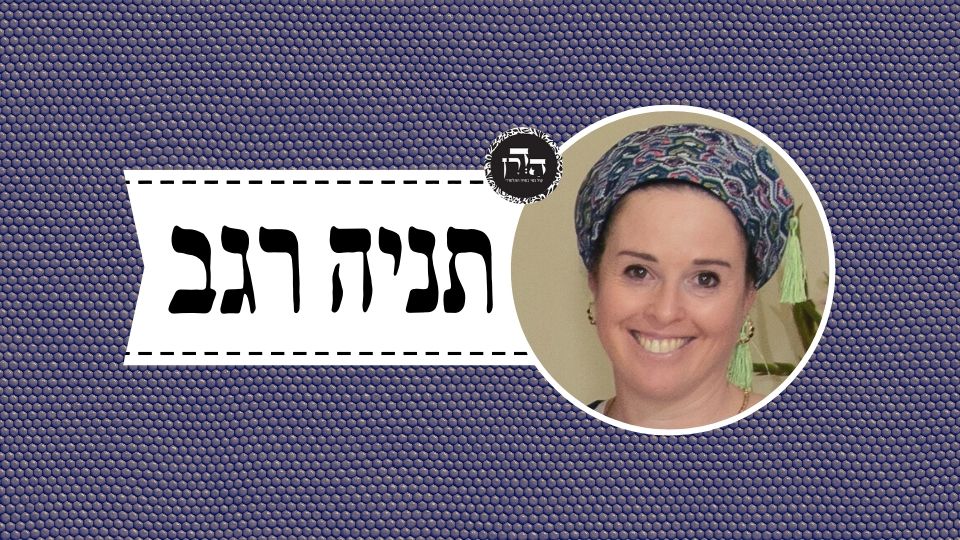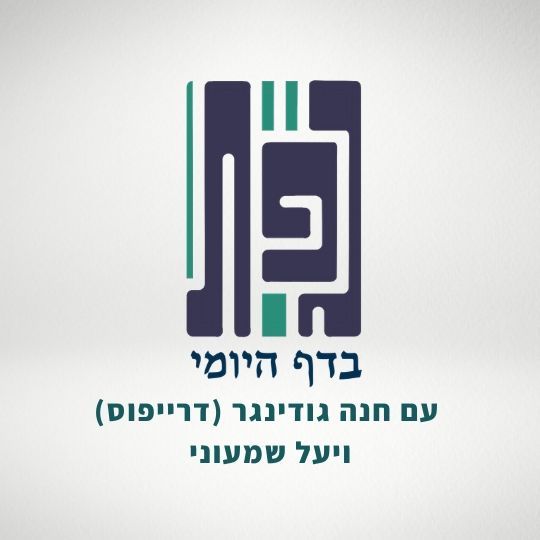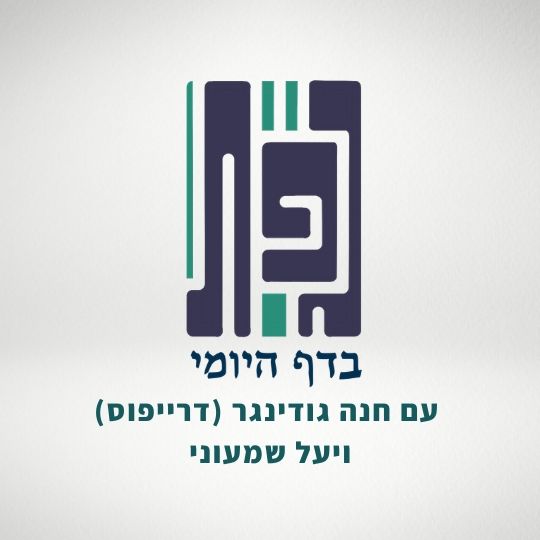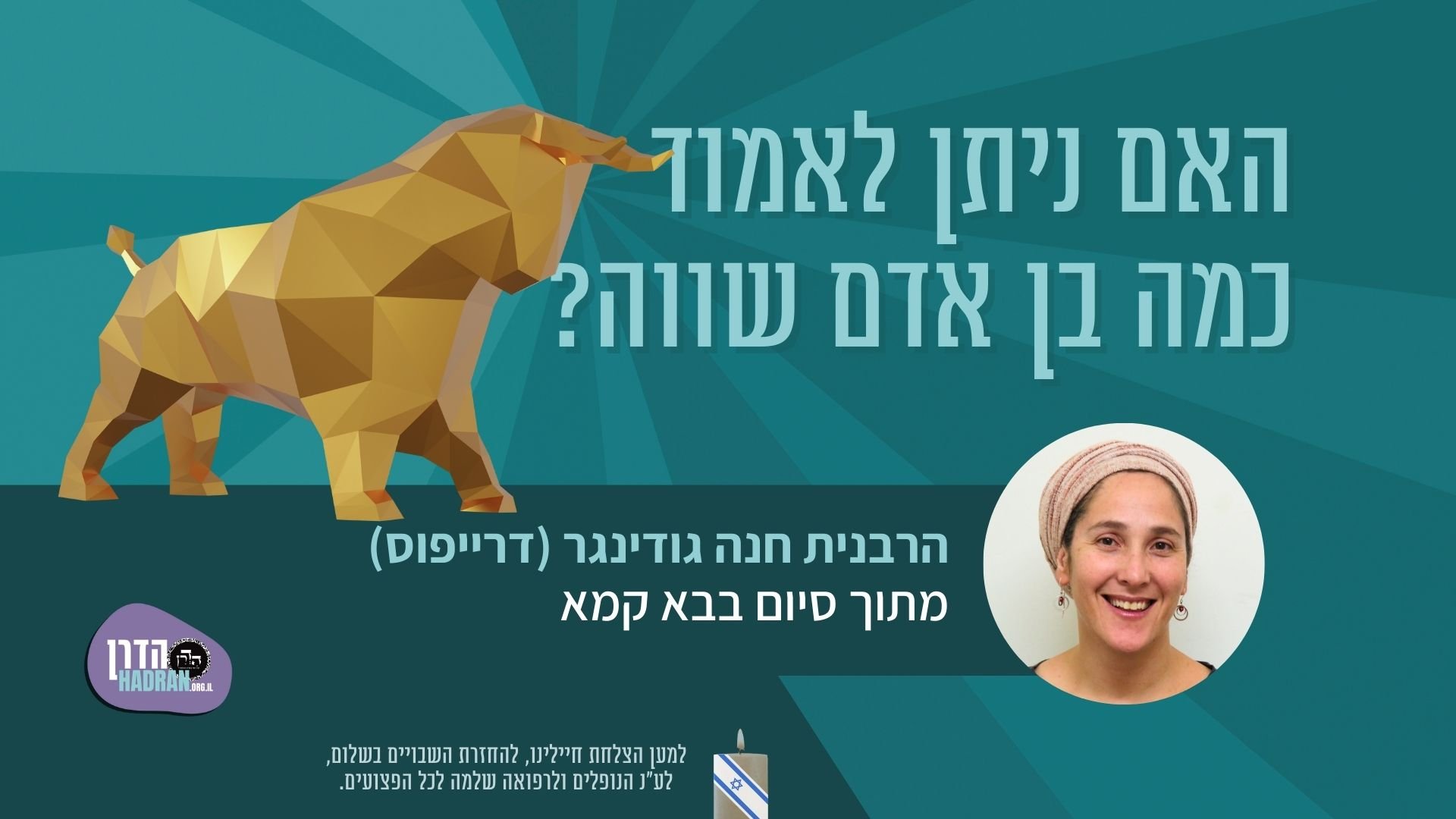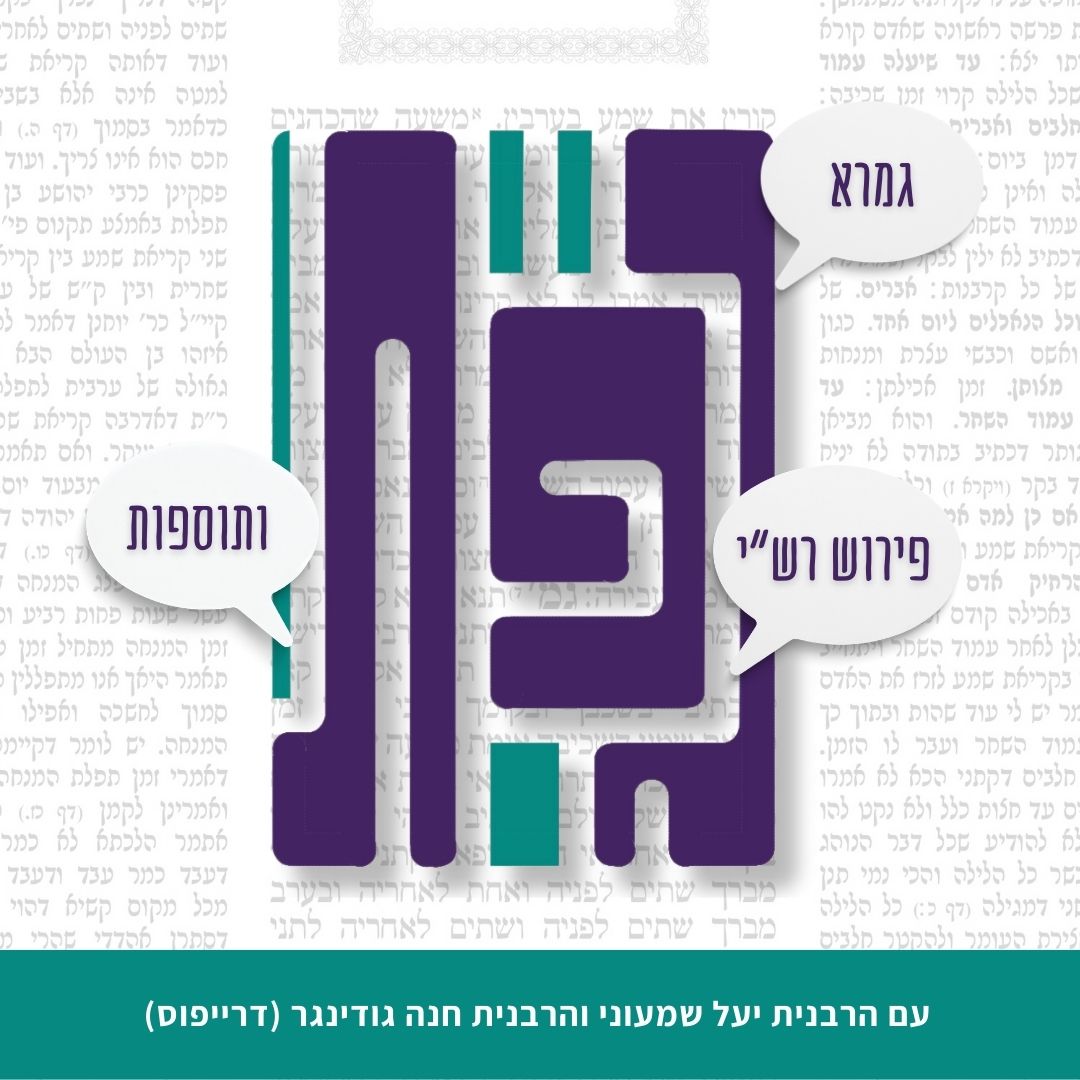הדיון ממשיך לגבי האוכל שלישי של חולין שנעשו על טהרת הקודש וחולין שנעשו על טהרת התרומה. דיון בשיטת רר’ שמעון במשנה שאמר ששחיטה מכשיר את הבהמה לקבל טומאה – האם כוונתו או דם או שחיטה או שחיטה בלבד?
הלימוד השבוע מוקדש לזכות ולשלום הַיְימׇנוֹט אֱמוּנָה בַּת באנצ’י (קָסָאוּ) בת 11 שנעלמה במקום מגוריה בצפת, לפני שנתיים, ביום ט”ז אדר תשפ”ד (25.2.24), ולא נודעו עקבותיה.
הלימוד השבוע מוקדש למען ביטחון המדינה, החיילים והאזרחים, ולמען חירותו של העם האיראני. שנזכה בקרוב שיתקיים בנו הפסוק: "לַיְּהוּדִים הָיְתָה אוֹרָה וְשִׂמְחָה וְשָׂשֹׂן וִיקָר”.
רוצה להקדיש שיעור?

כלים
הלימוד השבוע מוקדש לזכות ולשלום הַיְימׇנוֹט אֱמוּנָה בַּת באנצ’י (קָסָאוּ) בת 11 שנעלמה במקום מגוריה בצפת, לפני שנתיים, ביום ט”ז אדר תשפ”ד (25.2.24), ולא נודעו עקבותיה.
הלימוד השבוע מוקדש למען ביטחון המדינה, החיילים והאזרחים, ולמען חירותו של העם האיראני. שנזכה בקרוב שיתקיים בנו הפסוק: "לַיְּהוּדִים הָיְתָה אוֹרָה וְשִׂמְחָה וְשָׂשֹׂן וִיקָר”.
כלים
העמקה
רוצה להבין מה באמת קורה מתחת לפני השטח של הסוגיה?
שיעורים, פודקאסטים והרחבות של מיטב המורות שלנו יפתחו לך עוד זוויות וכיווני חשיבה.
חדשה בלימוד הגמרא?
זה הדף הראשון שלך? איזו התרגשות עצומה! יש לנו בדיוק את התכנים והכלים שיעזרו לך לעשות את הצעדים הראשונים ללמידה בקצב וברמה שלך, כך תוכלי להרגיש בנוח גם בתוך הסוגיות המורכבות ומאתגרות.
פסיפס הלומדות שלנו
גלי את קהילת הלומדות שלנו, מגוון נשים, רקעים וסיפורים. כולן חלק מתנועה ומסע מרגש ועוצמתי.
חולין לה
דְּלֵיכָּא כְּזַיִת בִּכְדֵי אֲכִילַת פְּרָס.
as there is not an olive-bulk of teruma in the amount of stew that he eats in the time it takes to eat a half-loaf of bread. Therefore, one need not treat the mixture with the level of purity required of teruma.
אָמַר רַבִּי יוֹנָתָן אָמַר רַבִּי: הָאוֹכֵל שְׁלִישִׁי שֶׁל תְּרוּמָה עַצְמָהּ – אָסוּר לֶאֱכוֹל, וּמוּתָּר לִיגַּע.
Rabbi Yonatan says that Rabbi Yehuda HaNasi says: For one who partakes of actual teruma that is impure with third-degree impurity, it is prohibited to partake of other teruma, but it is permitted to come into contact with teruma.
וְאִיצְטְרִיךְ דְּעוּלָּא, וְאִיצְטְרִיךְ דְּרַבִּי יוֹנָתָן, דְּאִי מִדְּעוּלָּא הֲוָה אָמֵינָא: הָנֵי מִילֵּי בְּחוּלִּין שֶׁנַּעֲשׂוּ עַל טׇהֳרַת תְּרוּמָה, אֲבָל תְּרוּמָה – בִּנְגִיעָה נָמֵי אָסוּר, אִיצְטְרִיךְ דְּרַבִּי יוֹנָתָן. וְאִי מִדְּרַבִּי יוֹנָתָן הֲוָה אָמֵינָא: הָנֵי מִילֵּי תְּרוּמָה, אֲבָל חוּלִּין – בַּאֲכִילָה נָמֵי שְׁרֵי, צְרִיכִי.
The Gemara notes that the statement of Ulla was necessary and the statement of Rabbi Yonatan was necessary. As, if the halakha were learned exclusively from the statement of Ulla, I would say: This statement applies with regard to non-sacred food items that were prepared on the level of purity of teruma, but with regard to teruma itself perhaps contact is also prohibited. Therefore, the statement of Rabbi Yonatan was necessary. And if the halakha were learned exclusively from the statement of Rabbi Yonatan, I would say: This statement applies with regard to teruma, but with regard to non-sacred food that was prepared with purity of teruma, perhaps eating it is also permitted. Therefore, both statements are necessary.
יָתֵיב רַב יִצְחָק בַּר שְׁמוּאֵל בַּר מָרְתָּא קַמֵּיהּ דְּרַב נַחְמָן, וְיָתֵיב וְקָאָמַר: הָאוֹכֵל שְׁלִישִׁי שֶׁל חוּלִּין שֶׁנַּעֲשׂוּ עַל טׇהֳרַת הַקֹּדֶשׁ – טָהוֹר לֶאֱכוֹל בַּקֹּדֶשׁ, שֶׁאֵין לְךָ דָּבָר שֶׁעוֹשֶׂה רְבִיעִי בַּקֹּדֶשׁ אֶלָּא קֹדֶשׁ מִקּוֹדֶשׁ בִּלְבַד.
§ Rav Yitzḥak bar Shmuel bar Marta was sitting before Rav Naḥman, and he was sitting and saying: With regard to one who eats non-sacred food items that were prepared on the level of purity of sacrificial food, and these items had become impure with third-degree impurity, he is ritually pure in terms of the right to partake of sacrificial food, as you have nothing that confers fourth-degree impurity in sacrificial food other than consecrated sacrificial food alone, but non-sacred food prepared with the purity of sacrificial food does not.
מֵתִיב רָמֵי בַּר חָמָא: שְׁלִישִׁי – שֵׁנִי לַקֹּדֶשׁ, וְאֵין שֵׁנִי לַתְּרוּמָה. בְּחוּלִּין שֶׁנַּעֲשׂוּ עַל טׇהֳרַת תְּרוּמָה. אַמַּאי? הָא לָאו קֹדֶשׁ מִקּוֹדֶשׁ הוּא!
Rami bar Ḥama raises an objection from the mishna cited earlier (33b): One who eats food with third-degree impurity assumes second–degree impurity vis-à-vis sacrificial food, and he does not assume second-degree impurity vis-à-vis teruma. Eating an item with third-degree impurity is feasible only in the case of non-sacred items, as partaking of impure teruma is prohibited. It is only possible in the case of non-sacred food items that were prepared as if their level of purity were on the level of the purity of teruma. According to the statement of Rav Yitzḥak bar Shmuel bar Marta, why does this food assume second-degree impurity? It is not sacrificial food, which is sanctified.
אֲמַר לֵיהּ: הַנַּח לִתְרוּמָה, שֶׁטׇּהֳרָתָהּ טוּמְאָה הִיא אֵצֶל הַקֹּדֶשׁ.
Rav Yitzḥak bar Shmuel bar Marta said to him: Leave teruma alone; its state of purity is impurity vis-à-vis sacrificial food. Therefore, non-sacred food that was prepared with the purity of teruma renders sacrificial food impure.
וּמְנָא תֵּימְרַאּ? דִּתְנַן: בִּגְדֵי עַם הָאָרֶץ מִדְרָס לִפְרוּשִׁין, בִּגְדֵי פְרוּשִׁין מִדְרָס לְאוֹכְלֵי תְרוּמָה, בִּגְדֵי אוֹכְלֵי תְרוּמָה מִדְרָס לַקֹּדֶשׁ.
The Gemara asks: And from where do you say that the purity of teruma is impurity vis-à-vis sacrificial food? It is from a mishna (Ḥagiga 18b), as we learned: The halakhic status of the garments of an am ha’aretz, who does not scrupulously observe the halakhot of ritual purity, is like that of items rendered impure by treading, e.g., items designated for sitting or lying upon which a zav or a menstruating woman sits or lies, which are rendered a primary source of ritual impurity for individuals who scrupulously observe the halakhot of ritual purity [perushin] and eat their non-sacred food in a state of purity. In other words, it is considered a primary level of impurity for them. The halakhic status of the garments of perushin is like that of items rendered impure by treading for priests who partake of teruma. In addition, the halakhic status of the garments of priests who partake of teruma is like that of items rendered impure by treading for those who eat sacrificial food.
אָמַר רָבָא: מִדְרָסוֹת קָאָמְרַתְּ? שָׁאנֵי מִדְרָסוֹת,
Rava said: Are you saying that one can cite proof from the halakha of items rendered impure by treading that the state of purity of teruma is impurity vis-à-vis sacrificial food? No proof may be cited from there, as the decree that the halakhic status of the garments of priests who partake of teruma is like that of items rendered impure by treading for those who eat sacrificial food is different,
שֶׁמָּא תֵּשֵׁב עֲלֵיהֶן אִשְׁתּוֹ נִדָּה, אֲבָל בְּפֵירֵי לָא אָמְרִינַן. וְרַבִּי יִצְחָק בְּפֵירֵי נָמֵי אָמַר.
as with regard to garments there is concern lest his wife sit upon them when she is impure with the impurity of a menstruating woman. But with regard to produce, we do not say that if it was prepared with the purity of teruma it renders sacrificial food impure, and Rabbi Yitzḥak states his halakha with regard to produce as well.
מֵתִיב רַבִּי יִרְמְיָה מִדִּיפְתִּי: וּמִי אָמְרִינַן בְּפֵירֵי? וְהָתְנַן: אִם אָמַר ״הִפְרַשְׁתִּי לְתוֹכָהּ רְבִיעִית קֹדֶשׁ״ – נֶאֱמָן, וְלָא קָא (מטמא) [מְטַמְּיָא] לֵיהּ תְּרוּמָה לְקֹדֶשׁ. וְאִי אָמְרַתְּ: טׇהֳרָתָהּ טוּמְאָה הִיא אֵצֶל הַקֹּדֶשׁ – תְּטַמֵּא תְּרוּמָה לְקֹדֶשׁ!
Rabbi Yirmeya of Difti raises an objection to the opinion of Rabbi Yitzḥak: And do we say with regard to produce that if it was prepared with the purity of teruma it renders sacrificial food impure? But didn’t we learn in a mishna (Ḥagiga 24b): It is not permitted for a priest to accept teruma wine from an am ha’aretz, but if an am ha’aretz says to the priest: I separated and placed into this barrel of teruma wine a quarter–log of sacrificial wine, he is deemed credible? And this indicates that teruma does not render the sacrificial food impure. And if you say with regard to teruma that its state of purity is impurity vis-à-vis sacrificial food, let the teruma render the sacrificial food impure.
אֲמַר לֵיהּ: טוּמְאָה בְּחִבּוּרִין קָאָמְרַתְּ? טוּמְאָה בְּחִבּוּרִין שָׁאנֵי, דְּמִגּוֹ דִּמְהֵימַן אַקֹּדֶשׁ – מְהֵימַן נָמֵי אַתְּרוּמָה.
Rabbi Yitzḥak said to Rabbi Yirmeya of Difti: Are you are saying that there is an objection to my opinion based on the case of impurity in a case of food items, the teruma wine and the sacrificial wine, that are attached in one barrel? Impurity in a case of food items that are attached is different, as, since the am ha’aretz is deemed credible with regard to the sacrificial food, he is deemed credible with regard to the teruma as well.
מֵתִיב רַב הוּנָא בַּר נָתָן: הַשֵּׁנִי שֶׁבַּחוּלִּין מְטַמֵּא מַשְׁקֵה חוּלִּין, וּפוֹסֵל אוֹכְלֵי תְרוּמָה, וְהַשְּׁלִישִׁי מְטַמֵּא מַשְׁקֵה קֹדֶשׁ, וּפוֹסֵל אוֹכְלֵי קֹדֶשׁ, בְּחוּלִּין שֶׁנַּעֲשׂוּ עַל טׇהֳרַת הַקֹּדֶשׁ.
Rav Huna bar Natan raises an objection from a baraita to the opinion of Rabbi Yitzḥak with regard to rendering sacrificial food impure with fourth-degree ritual impurity: Non-sacred food that is impure with second-degree impurity renders impure through contact a non-sacred liquid, which assumes first-degree impurity, and disqualifies teruma foods, in the sense that those foods are impure but do not transmit impurity to other food. And non-sacred food that is impure with third-degree impurity renders impure through contact a sacrificial liquid and disqualifies sacrificial foods, in the case of non-sacred food items that were prepared on the level of purity of sacrificial food. This contradicts the opinion of Rabbi Yitzḥak, who said that there is nothing that confers fourth-degree impurity in sacrificial food other than consecrated sacrificial food alone, but not non-sacred food prepared with the purity of sacrificial food.
תַּנָּאֵי הִיא, דְּתַנְיָא: חוּלִּין שֶׁנַּעֲשׂוּ עַל טׇהֳרַת קֹדֶשׁ – הֲרֵי הֵן כְּחוּלִּין.
The Gemara answers that this matter is a dispute between tanna’im, as it is taught in a baraita: The halakhic status of non-sacred food items that were prepared on the level of purity of sacrificial food is like that of non-sacred foods, and they are incapable of assuming third-degree impurity.
רַבִּי אֶלְעָזָר בְּרַבִּי צָדוֹק אוֹמֵר: הֲרֵי הֵן כִּתְרוּמָה, לְטַמֵּא שְׁנַיִם, וְלִפְסוֹל אֶחָד.
Rabbi Elazar, son of Rabbi Tzadok, says: The halakhic status of non-sacred food items that were prepared on the level of purity of sacrificial food is like that of teruma. Accordingly, a primary source of ritual impurity is able to render two items impure: The food item with which it comes into contact assumes first-degree impurity, and the food item with which that came into contact assumes second-degree impurity. And that item is able to disqualify one further item, which assumes third-degree impurity but will not render sacrificial food impure with fourth-degree impurity. According to both opinions in this baraita, non-sacred food prepared with the purity of sacrificial food does not disqualify sacrificial food. According to the mishna in Teharot, it does disqualify sacrificial food.
רַבִּי שִׁמְעוֹן אוֹמֵר: הוּכְשְׁרוּ בִּשְׁחִיטָה. אָמַר רַב אַסִּי: אוֹמֵר הָיָה רַבִּי שִׁמְעוֹן, שְׁחִיטָתוֹ מַכְשֶׁרֶת וְלֹא דָּם.
§ The mishna states (33a): In the case of one who slaughters a domesticated animal, an undomesticated animal, or a bird, and blood did not emerge from them, Rabbi Shimon says: They were rendered susceptible to ritual impurity by means of the slaughter itself. Rav Asi said that Rabbi Shimon would say: It is its slaughter that renders it susceptible to ritual impurity, and not the blood that emerges during the slaughter.
לֵימָא מְסַיַּיע לֵיהּ, רַבִּי שִׁמְעוֹן אוֹמֵר: הוּכְשְׁרוּ בִּשְׁחִיטָה. מַאי לָאו בִּשְׁחִיטָה וְלָא בְּדָם? לָא, אַף בִּשְׁחִיטָה.
The Gemara suggests: Let us say that the mishna supports the opinion of Rav Asi. Rabbi Shimon says: They were rendered susceptible to ritual impurity by means of the slaughter itself. The Gemara asks: What, is it not that Rabbi Shimon is saying: By means of the slaughter and not by means of the blood from the slaughter? The Gemara answers: No, perhaps Rabbi Shimon is saying: The animal can be rendered susceptible to ritual impurity by means of blood and also by means of slaughter.
תָּא שְׁמַע: אָמַר לָהֶן רַבִּי שִׁמְעוֹן: וְכִי הַדָּם מַכְשִׁיר? וַהֲלֹא שְׁחִיטָה מַכְשֶׁרֶת! הָכִי קָאָמַר לָהֶן: וְכִי דָם בִּלְבַד מַכְשִׁיר? אַף שְׁחִיטָה נָמֵי מַכְשֶׁרֶת.
The Gemara suggests: Come and hear a baraita is support of Rav Asi’s statement. Rabbi Shimon said to the Rabbis: Is it blood that renders the animal susceptible to ritual impurity? But isn’t it slaughter that renders it susceptible? This indicates that Rabbi Shimon holds that it is specifically the slaughter and not the blood that renders the flesh susceptible to impurity. The Gemara rejects this proof. This is what Rabbi Shimon is saying to the Rabbis: Is it blood alone that renders the animal susceptible to ritual impurity? Slaughter too renders it susceptible.
תָּא שְׁמַע: רַבִּי שִׁמְעוֹן אוֹמֵר: דַּם הַמֵּת אֵינוֹ מַכְשִׁיר. מַאי לָאו, הָא דַּם שְׁחִיטָה מַכְשִׁיר? לָא, הָא דַּם חֲלָלִים מַכְשִׁיר, אֲבָל דַּם שְׁחִיטָה מַאי – לָא מַכְשִׁיר?
The Gemara suggests: Come and hear a baraita contrary to Rav Asi’s statement. Rabbi Shimon says: Blood of the animal that is dead of natural causes does not render food items susceptible to ritual impurity. What, is it not that one may infer that blood of slaughter renders food items susceptible to ritual impurity? The Gemara rejects this proof. No, infer that blood of animals that are killed renders food items susceptible to ritual impurity. The Gemara asks: But with regard to blood of slaughter, what then is the halakha; that it does not render food items susceptible to ritual impurity?
לַישְׁמְעִינַן דַּם שְׁחִיטָה, וְכׇל שֶׁכֵּן דַּם הַמֵּת! דַּם הַמֵּת אִיצְטְרִיכָא לֵיהּ, סָלְקָא דַּעְתָּךְ אָמֵינָא: מָה לִי קַטְלֵיהּ אִיהוּ, מָה לִי קַטְלֵיהּ מַלְאַךְ הַמָּוֶת? קָא מַשְׁמַע לַן.
If so, let Rabbi Shimon teach us that blood of slaughter does not render the animal susceptible to ritual impurity, and we will conclude that all the more so that is the halakha with regard to blood of the animal that is dead as a result of natural causes. The Gemara answers: It was necessary for Rabbi Shimon to teach the halakha of blood of the animal that is dead as a result of natural causes, as it could enter your mind to say: What difference is there to me if one killed the animal himself, and what difference is there to me if the animal was killed by the angel of death? In both cases the blood should render the animal susceptible to ritual impurity. Therefore, Rabbi Shimon teaches us that unlike blood of an animal that was killed, blood of an animal that is dead as a result of natural causes does not render food items susceptible to ritual impurity, and no inference may be drawn with regard to blood of slaughter.
תָּא שְׁמַע: רַבִּי שִׁמְעוֹן אוֹמֵר: דַּם מַגֵּפָתוֹ אֵינוֹ מַכְשִׁיר. מַאי לָאו, הָא דַּם שְׁחִיטָה מַכְשִׁיר? לָא, הָא דַּם חֲלָלִים מַכְשִׁיר. אֲבָל דַּם שְׁחִיטָה מַאי, לָא מַכְשִׁיר?
The Gemara suggests: Come and hear another baraita contrary to Rav Asi’s statement. Rabbi Shimon says: Blood of the wound of an animal does not render other items susceptible to ritual impurity. What, is it not that one may infer that blood of slaughter renders food items susceptible to ritual impurity? The Gemara rejects this proof. No, infer that blood of animals that are killed renders food items susceptible to ritual impurity. The Gemara asks: But with regard to blood of slaughter, what is the halakha; that it does not render food items susceptible to ritual impurity?
לַשְׁמְעִינַן דַּם שְׁחִיטָה, וְכׇל שֶׁכֵּן דַּם מַגֵּפָתוֹ! דַּם מַגֵּפָתוֹ אִיצְטְרִיכָא לֵיהּ, סָלְקָא דַּעְתָּךְ אָמֵינָא: מָה לִי קַטְלֵיהּ כּוּלֵּהּ, מָה לִי קַטְלֵיהּ פַּלְגָא.
If so, let Rabbi Shimon teach us that blood of slaughter does not render the animal susceptible to ritual impurity, and we will conclude that all the more so that is the halakha with regard to blood of its wound. The Gemara answers: It was necessary for Rabbi Shimon to teach blood of its wound, as it could enter your mind to say: What difference is there to me if one killed the entire animal, and what difference is there to me if one killed half of the animal, i.e., wounded it? In both cases the blood should render the animal susceptible to ritual impurity. Therefore, Rabbi Shimon teaches that unlike the blood of an animal that was killed, the blood from an animal’s wound does not render food items susceptible to ritual impurity, and no inference may be drawn with regard to blood of slaughter.
וּמַאי שְׁנָא דַּם חֲלָלִים דְּמַכְשַׁיר? דִּכְתִיב: ״וְדַם חֲלָלִים יִשְׁתֶּה״.
The Gemara asks: What is different with regard to blood of animals that are killed that they render food items susceptible to ritual impurity? It is due to the fact that it is written: “Behold, they are a people that rises up as a lioness, and as a lion he lifts himself up; he shall not lie down until he eats of the prey and drinks blood of carcasses” (Numbers 23:24). The fact that the blood of a carcass, which in the context of the verse is referring to an animal that was killed, is mentioned in the context of drinking, indicates that it is a liquid that renders food items susceptible to ritual impurity.
דַּם שְׁחִיטָה נָמֵי כְּתִיב: ״עַל הָאָרֶץ תִּשְׁפְּכֶנּוּ כַּמָּיִם״! הָהוּא לְמִישְׁרֵי דָּמָן דִּפְסוּלֵי הַמּוּקְדָּשִׁין בַּהֲנָאָה הוּא דַּאֲתָא.
With regard to blood of slaughter it is also written: “Only, you shall not eat the blood; you shall pour it upon the earth as water” (Deuteronomy 12:16). The parallel to water ostensibly indicates that the blood of slaughter should also render food items susceptible to ritual impurity. The Gemara answers: That verse is not written with regard to susceptibility to impurity. The purpose for which it comes is to permit benefit from the blood of disqualified consecrated animals.

